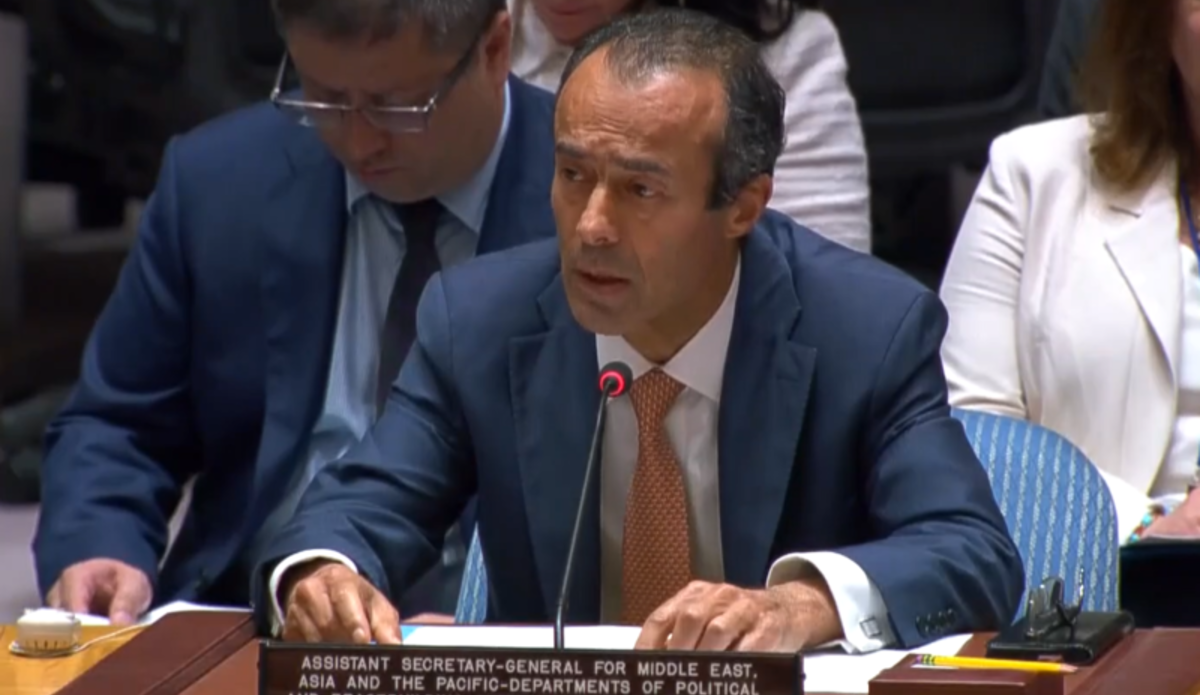ASSISTANT SECRETARY-GENERAL KHALED KHIARI’S
REMARKS TO THE SECURITY COUNCIL ON
NON-PROLIFERATION/DPRK
New York, 13 July 2023
Mr President,
The Democratic People’s Republic of Korea (DPRK) launched its Hwasong-18 intercontinental ballistic missile on 12 July.
This was the DPRK’s second launch of its new solid-fuel intercontinental ballistic missile. As we have previously briefed, solid-propellant missiles do not need to undergo fuelling prior to launch and thus can be launched more quickly than liquid-propellant missiles.
The missile was launched on a lofted trajectory from the Pyongyang area at 10:00 am local time and reportedly flew around 1,000 km and to an altitude of around 6,600 km before falling into the sea, inside the Russian Federation’s Exclusive Economic Zone. The flight was reportedly around 74 minutes, potentially making it the DPRK’s longest ballistic missile flight duration.
The systems the DPRK tested on 12 July, 13 April, 16 March, 18 February this year, as well as on five occasions last year, can reach most points on Earth.
The DPRK did not issue airspace or maritime safety notifications for this launch. As recently reiterated by the International Civil Aviation Organization as well as the International Maritime Organization, the DPRK’s unannounced launches represent a serious risk to international civil aviation and maritime traffic.
Mr President,
The Secretary-General strongly condemns the DPRK’s launch of yet another ballistic missile of intercontinental range.
He reiterates his calls on the DPRK to fully comply with its international obligations under all relevant Security Council resolutions and to resume dialogue without preconditions leading to sustainable peace and the complete and verifiable denuclearization of the Korean Peninsula.
Mr President,
The DPRK’s official news agency said that the latest launch of the Hwasong-18 ballistic missile was to quote “deter the dangerous military moves of the hostile forces” end quote. The DPRK also said that the country would strengthen its so-called nuclear deterrent in line with its five-year military development plan unveiled in January 2021. That plan provided for the development of specific capabilities, many involving the DPRK pursuing its nuclear weapons and ballistic missile programmes, in violation of the relevant Security Council resolutions.
The DPRK significantly increased its missile launch activities in 2022 and 2023, including more than 90 launches using ballistic missile technology.
As we have previously briefed, the DPRK attempted to launch its first military satellite with what it described as a“new-type carrier rocket” using ballistic missile technology on 31 May. The DPRK has reported on the failure and reiterated that it would conduct a second launch as soon as possible. While it is the right of any sovereign state to launch a satellite and to benefit from peaceful space activities, the relevant Security Council resolutions expressly prohibit the DPRK from conducting any launches using ballistic missile technology.
Mr President,
Key peace and security issues, such as the situation on the Korean Peninsula, must be an area for cooperation.
We welcome the Security Council’s commitment, as expressed in resolution 2397 (2017), to a peaceful, comprehensive, diplomatic, and political solution to the situation on the Korean Peninsula.
The status quo is alarming and unsustainable.
Mr President,
In a fortnight, we will observe the 70th anniversary of the Korean War Armistice Agreement. It is a tragic reality that tensions persist and remain unresolved even after seven decades.
As we have previously briefed, there are several practical measures that can be taken to reduce tensions, reverse the dangerous dynamic, and create space to explore diplomatic avenues. While I won't reiterate them, I do emphasise the importance of re-establishing communication channels, particularly those between military entities, and exercisingmaximum restraint. It is critical to avoid an unintended escalation.
In addition, pending the complete and verifiable denuclearization of the Korean Peninsula, it is imperative that the DPRK maintains the highest level of safety at its nuclear facilities.
Mr President,
I would like to highlight once more our concerns regarding the humanitarian situation in the DPRK. The United Nations is ready to assist the DPRK in addressing basic needs of its vulnerable populations.
Given the positive advancements in vaccines and treatments and the declaration by the World Health Organization Director-General on 5 May that COVID-19 is no longer a public health emergency of international concern, we urge the DPRK to allow the unimpeded re-entry and rotation of the international community, including our staff and the United Nations Resident Coordinator.
This collective return will yield a positive impact in supporting the people, bolstering relations, and, importantly,fortifying communication channels.
Diplomacy - not isolation - is the only way forward.
In this respect, I would like to acknowledge the participation of the Permanent Representatives from the Democratic People’s Republic of Korea as well as the Republic of Korea in this meeting.
Let me close by stressing that the unity of the Security Council on the DPRK is essential to ease tensions and overcome the diplomatic impasse. The primary responsibility for international peace and security rests with this Council.
Thank you, Mr President.

